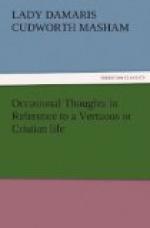But Vertue is not (tho often so misrepresented) included in Innocency; or does consist in a partial Practice of Actions praiseworthy; for its extent is equal to our liberty of Action; and its Principle the most Active one of the Mind; Vertue being the natural result of a sincere desire to conform in all things to the Law set us by our Maker; which who so truly endeavours, will not find much occasion for such kind of Advices as the above-mentioned ones, either to correct their Faults, or teach them to put a mask over them; an ill use sometimes made of this sort of Instructions: However a better might be, since it is true, that young People from the Experience of others may learn many things in reference to their Conduct, the knowledge whereof they would buy too dear at their own. The difficulty yet that there is in applying general Rules to particular Cases, makes (I presume) Books of this sort, how good soever in the kind, of less advantage to those who most need them, than some imagine them to be.
This which was then said on the Subject of these Conseils (lying by accident in the way) suggests to me now two things, wherein the Documents ordinarily given to such young Ladies, as are intended to have the best care taken of their Instruction, are, I think, very defective; and the fitter to be redress’d, as being of peculiar ill consequence in a Sceptical, loose and unthinking Age; wherein Wit is apt to pass upon many for Reason.
The first of these is, That those Notions, or Ideas of Vertue, and consequent Rules of Action, which are usually given to such young Persons, do rarely carry along with them an entire conviction of their Truth and Reasonableness: Whence if these Instructions at any time happen strongly to cross the Inclinations of those to whom they are given, it will appear rational to question their Solidity: And when Principles that thwart People’s passions or interests, come once to be doubted of by them, it is great odds, that they will sooner be slighted, than better examin’d.




